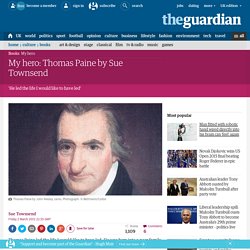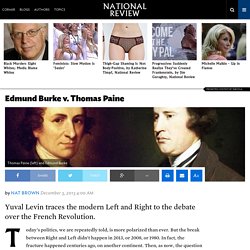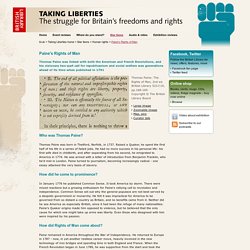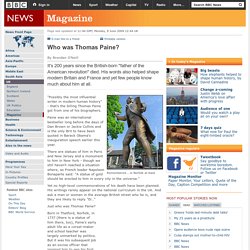

My hero: Thomas Paine by Sue Townsend. Thomas Paine led the life I would like to have led.

He was born into a poor family in Norfolk, became a corset-maker and then taught in a village school. He became involved in republican politics, through which he met Benjamin Franklin, who invited him to go to America. Thanks to Common Sense, he was an important figure in the American revolution and is one of the founding fathers of the US. In 1790 he went, full of ardour, to revolutionary France, where he voted for the French republic but before too long fell foul of Robespierre. Rights of Man is my favourite book.
More than ever I believe in the republican cause. Thomas Paine - American Revolution. ‘I know not whether any man in the world has had more influence on its inhabitants or affairs for the last thirty years than Tom Paine.’

So wrote John Adams in 1805. In an age of political pamphleteering, Paine had become the most influential pamphleteer of all. His writings remain classic statements of the egalitarian, democratic faith of the Age of Revolution. Paine’s origins lay among the lower orders of eighteenth-century England. The son of a Quaker corset maker, he practiced his father’s trade and then worked as an excise tax collector.
Paine immigrated to Philadelphia in 1774 and soon became acquainted with advocates of political change. Common Sense sold perhaps 150,000 copies in 1776, a tribute to both the persuasiveness of Paine’s argument and the clarity and power of his literary style. Returning to Europe in 1787, Paine soon entered the political debate launched by the French Revolution. The Reader’s Companion to American History.
Edmund Burke v. Thomas Paine. Yuval Levin traces the modern Left and Right to the debate over the French Revolution.

Today’s politics, we are repeatedly told, is more polarized than ever. But the break between Right and Left didn’t happen in 2013, or 2008, or 1980. In fact, the fracture happened centuries ago, on another continent. Then, as now, the question that divides us is: What role should the past play in determining our political future? This question arose during the French Revolution and was articulated most clearly in the disagreement between two of the greatest political thinkers of their (or any) age: the British Whig statesman Edmund Burke and the Anglo-American radical Thomas Paine.
Burke argued in his Reflections on the Revolution in France that that revolution had brought about an unprecedented destruction of a nation’s social fabric and risked devolving into barbarism and tyranny. For all their future disagreements, the two men came from surprisingly similar backgrounds. Levin also urges caution. Taking Liberties - Star Items - Paine's Rights of Man. Thomas Paine was linked with both the American and French Revolutions, and his visionary two-part call for republicanism and social welfare was generations ahead of its time when published in 1791 Who was Thomas Paine?

Thomas Paine was born in Thetford, Norfolk, in 1737. Raised a Quaker, he spent the first half of his life in a series of failed jobs. He had no more success in his personal life: his first wife died in childbirth, and after separating from his second, he emigrated to America in 1774. He was armed with a letter of introduction from Benjamin Franklin, who he'd met in London. How did he come to prominence? In January 1776 he published Common Sense. How did Rights of Man come about? Who was Thomas Paine? It's 200 years since the British-born "father of the American revolution" died.

His words also helped shape modern Britain and France and yet few people know much about him at all. "Possibly the most influential writer in modern human history" - that's the billing Thomas Paine got from one of his biographers. Paine was an international bestseller long before the days of Dan Brown or Jackie Collins and is the only Brit to have been quoted in Barack Obama's inauguration speech earlier this year.
There are statues of him in Paris and New Jersey and a monument to him in New York - though we still haven't reached a situation where, as French leader Napoleon Bonaparte said: "A statue of gold should be erected to him in every city in the universe. " Yet no high-level commemorations of his death have been planned. Just who was Thomas Paine? Paine's legacy felt 200 years on Common (sense) man Paine threw his lot in with those Americans who were thirsting for independence from Britain. History - British History in depth: Thomas Paine: Citizen of the World.